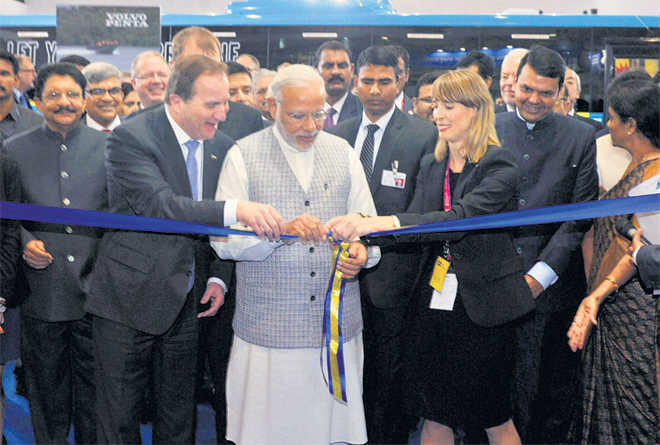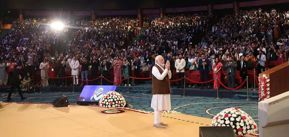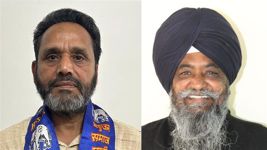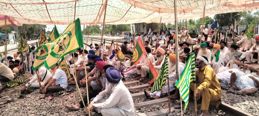
Modi and Swedish PM Stefan Lofven at the ''Make in India Week'' event in Mumbai. PTI
Ashok Sharma
India's former ambassador to Finland
The first India-Nordic Summit on April 17 is an acknowledgement by the technologically advanced Nordic countries (Denmark, Finland, Iceland, Norway and Sweden) that India is not only a growing market but also an important business partner. This was also highlighted in February, 2016, when Prime Minister of Sweden Stefan Lofven and Prime Minister of Finland Juha Sipila visited Mumbai for the inauguration of the "Make In India Week".
The proposal to host an India-Nordic Summit mooted by PM Modi was gladly accepted by Lofven. The two PMs have invited the leaders of the other four Nordic countries. This is only the second time that all five Nordic leaders will be present in a summit-level meeting with an important partner country. President Obama had met the Heads of State of the five Nordic countries in Stockholm in September, 2013 before the G20 Summit in St Petersburg.
During the summit with PM Modi, the countries will be represented by their PMs, which makes it more businesslike.
India's relations with the Nordic countries have been developing steadily, except for some stagnation in bilateral relations with Denmark as high-level interactions were almost frozen since the Purulia arms drop case. This will be first time since September, 2009 when the PMs of India and Denmark will have a bilateral meeting. President Pranab Mukherjee had visited Norway and Finland in October, 2014 and Sweden in June, 2015.
Even though the economies of individual Nordic countries are much smaller than those of the G20 countries, their combined GDP is over $1.5 trillion and per capita income over $54,000. With a territory bigger than India's (over 3.42 million sq km), and a population of only 2.7 crore (less than Haryana), these countries are among the top in education, quality of life, civil liberties, human development, economic competitiveness and environmental protection. 'Save the Children' puts them at 1-5 topmost ranks in child rights. Except Norway (which has abundant oil and gas resources) and Sweden (which has metals, uranium etc), these countries do not have much natural resources, except timber and water.
However, through technological advancement and human resource development, they have achieved high levels of industrialisation. Their technology in sectors like dairy, food processing, biotechnology, pharmaceuticals, ship-building, maritime, oil and gas services, telecommunications, renewable energy, smart grids, electronics, pulp and paper, forestry, information technology, environmental sciences and climate change, smart cities, circular economy and waste management have been identified as key areas of cooperation in the "Make In India" programme.
India has a trade turnover of about $5.3 billion annually with these countries and has attracted FDIs of over $2.5 billion. Trade balance has been in favour of the Nordic countries. Bilateral cooperation is multi-faceted and whereas Nordic companies have a big presence in India, several lndian business houses (especially IT firms) have a considerable presence in these countries.
Sweden is India's biggest trade and technology partner in this region. One of India's largest business conglomerates, L&T, was started by two Danish engineers (having surnames Larsen and Toubro) during the World War II. Nokia had popularised Finland's technological prowess in India and was the most popular mobile phone brand till it quit this business. The Norwegian Sovereign Wealth Fund is a big investor in India, with a portfolio of $11.7 billion.
Some well-known Nordic companies in India are Volvo, Ericsson, Alfa Laval, Tetra Pak, IKEA, Carlsberg, Emmvee Solar, Scandic Food, Vestas, Wartsila, Kone, Metsa, Ahlstrom, Telenor and Elkem.
The India-Nordic Summit should be seen in a wider perspective. These countries have been able to achieve something that PM Modi has advocated. The Nordic countries have presented the concept of a welfare state within the framework of capitalism rather than the socialism (or, state capitalism) through the democratic process. While communism and Soviet-style socialism have suffered setbacks, the Nordic model is thriving and has shown that the concepts of democracy and welfare society can coexist. This is a unique welfare model within parliamentary democracy and market economy combined with strong labour unions and a universalist welfare system financed by heavy taxes which has led to a high degree of income redistribution with little social unrest. This can be illustrated by the fact that in Norway, petrol and diesel prices are 80 per cent higher than India even though it is an exporter of oil and gas (third largest exporter of natural gas). This democratic welfare system enhances individual autonomy, promotes social mobility, provides economic security and creates opportunities within the private ownership, free market and free trade. It is a corporatist system with tripartite arrangement where the representatives of labour and employers negotiate wages and labour market policies mediated by the government. The ownership is private but widely held, and the government also participates as a direct shareholder or, through various funds.
Another feature of these countries is universal free education, free healthcare, gender equality by maximising gender participation, free childcare (daycare) and care for the sick and elderly. Manufacturing has been gradually declining in all these economies except Norway (where it still stands at 35 per cent due to its oil and gas sector). Services sector has an increasing role and new vistas in this sector are opening due to the welfare activities funded by the public sector. Individuals are no more dependent on their families for care in case of need which has provided more freedom to the citizens.
The Nordic welfare model
In January, 2017, Finland became the first country to experiment with the universal basic income which will transfer money directly to all beneficiaries every month without any strings attached which will do away with the bureaucracy. Free from the fear of becoming destitute, more people can pursue creative interest or, start their own businesses through innovative ideas. This will also act as a cushion for workers whose jobs might be replaced by automation or robots. The Nordic welfare model has not only done away with the dependence on the family but has also created an environment for rational thinking, innovation and scientific temper while weakening the institution of religion. They are moving in the direction of post-industrial society and have some lessons for India.



























